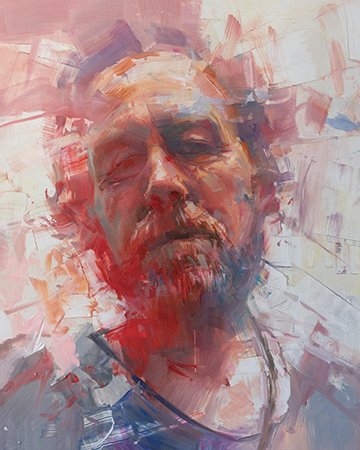Torsten Wolber, Three Graces, oil
Torsten Wolber
Contemporary expressionist, Torsten Wolber, brilliantly captures fleeting impressions of his subjects through vibrant and intuitive pieces.
German artist, Torsten Wolber, never thought of himself as an artistically gifted child. He had a mild interest in drawing early on, but remembers it as more of a hobby than a passion. Surprisingly, these humble beginnings led him on an artistic journey that began with illustration and has culminated in an accomplished career as an expressionistic painter.
Wolber’s process is deliberate, yet he works quickly and spontaneously, relying on intuitive decisions rather than overthinking. The end result is extraordinary — exciting, bold, and expressive paintings that grace private collections all over the world.
We had an in-depth conversation with the Cologne-based artist about his work.
Torsten Wolber, Empty Hands, oil
Why did you choose to work exclusively with oils in 2020 after decades as a successful illustrator?
Since I was 14, illustration was always my dream job. But after 28 years I had done pretty much everything you can imagine, so routine inevitably creeps in. Also, the work became increasingly hectic and fast-paced, leaving me little room to produce really good and satisfying work.
But the main reason was that I became increasingly aware that at some point I wanted to experience what painting is. It became number one on my bucket list. I somehow knew that if I didn't manage to do that in this life, I would have missed out on a significant part of it.
I also suspected that I wouldn't be able to start at age 60 if I was really serious about it. So, after my 55th birthday, I pulled the ripcord and was a painter the next day. Ta-da! In hindsight, it was not bad timing considering that AI now does exactly what I used to do, only cheaper, faster and, unfortunately, often better.
Torsten Wolber, Modern Rehearsal, oil
There is a strong sense of freedom and boldness in your work, a confidence that can be felt. How would you describe your style and technique and how they evolved?
I’m glad that comes across. I’m always amazed at the confidence my work evokes. Without really knowing it, I believe I had waited so long to start painting that the continued excitement and liberation is actually reflected in my work.
I would have thought that the reorientation from illustration toward independent energy and expression would have happened faster, but almost three decades of commissioned work had obviously engraved the client's good in my mind.
Breaking free from this was harder than I thought and involved not accepting any commissioned work in 2023 because it kept me stuck in my old, results-oriented mindset. Only since then have I been able to fully embrace my art and therefore, myself.
So my style is essentially based on techniques to counteract goal-oriented thinking and complete control over the result. I deliberately start chaotically, let coincidence decide, put myself under time pressure which forces me to make intuitive quick decisions and keep the result relatively open until the end. All of this prevents my head from getting involved and taking the lead. The better I manage to do this, the more I can establish this feeling of dissolving into freedom in my work.
You’ve done a lot of plein air painting, do you prefer that to studio work?
I wouldn't say that I prefer painting outside, but many aspects of plein air painting have become an integral part of my studio work. In fact, plein air painting helped me to discover my enthusiasm for painting.
In 2010 I wanted to develop my painting skills but I didn't have a studio at the time, so I started painting outside. To put it mildly, I had greatly underestimated the challenges of plein air, leading to nothing but frustration. But at the same time, I thought “if you can do that, then you can paint anything.” So, I kept at it, even though my paintings were really bad back then … really!
Torsten Wolber, Self-Portrait, oil
What drew you to the alla prima technique (an approach where wet paint is applied in layers on wet paint, usually in a single setting, calling for precise brush work due to the limited time frame)?
I was already familiar with alla prima from plein air painting. But bringing this technique to the studio gave me complete freedom in my process. I could paint very quickly in a precise way with strong and decisive strokes. But I could still push, pull, delete, add, or change my mind at any time, all while remaining open to incoming creative inspiration as I worked.
Everything is literally in flow, resulting in a loose, yet realistic, treatment of the subject which brings expression to the fore through spontaneity and intuition.
What advice would you give aspiring artists?
First, your desire to express yourself is too precious to allow it to be jeopardized by fear and doubt. This applies to fundamental decisions about art as well as the creative process itself. Tell your doubts and fears that you will be there for them again after the creative work is done.
Second, don’t worry too much about finding your own style. You don't have to find it, you will discover it over time. However, you can make a significant contribution by actively questioning your motives and how you can reinforce them with your artistic means. What do you want to create? Why? And how can you give this energy as much space as possible in your work? Don't think of a closet, think of a cathedral.
Find out more about Wolber’s work at @torstenwolber and www.allaprima.de.
All artwork © Torsten Wolber, shared with permission.





